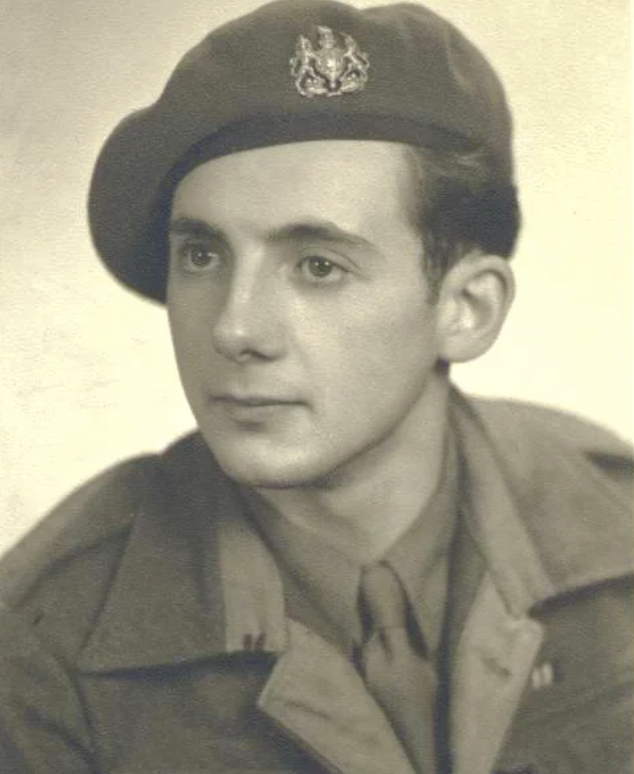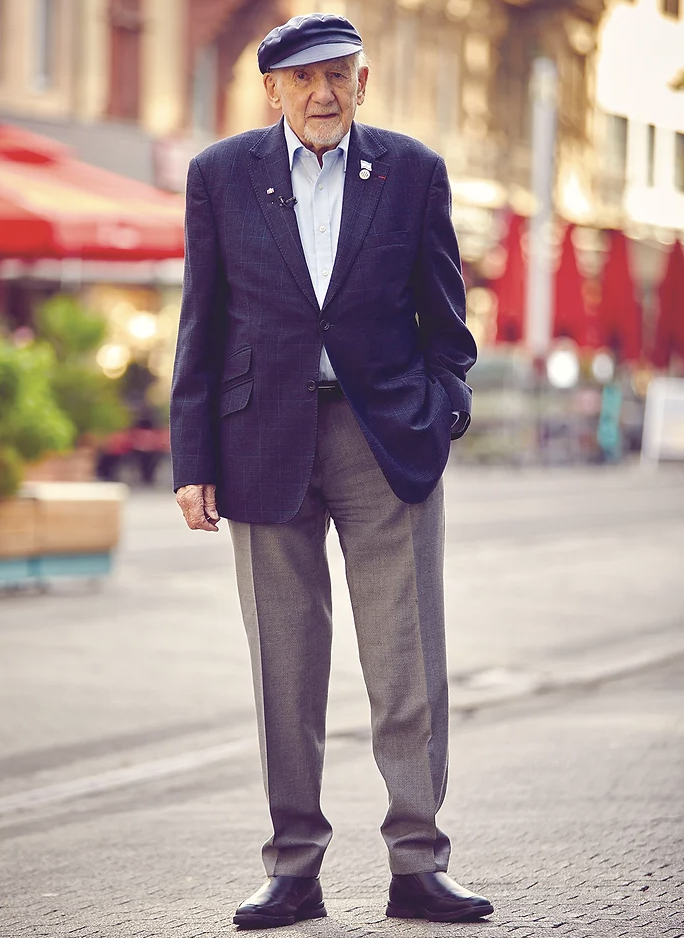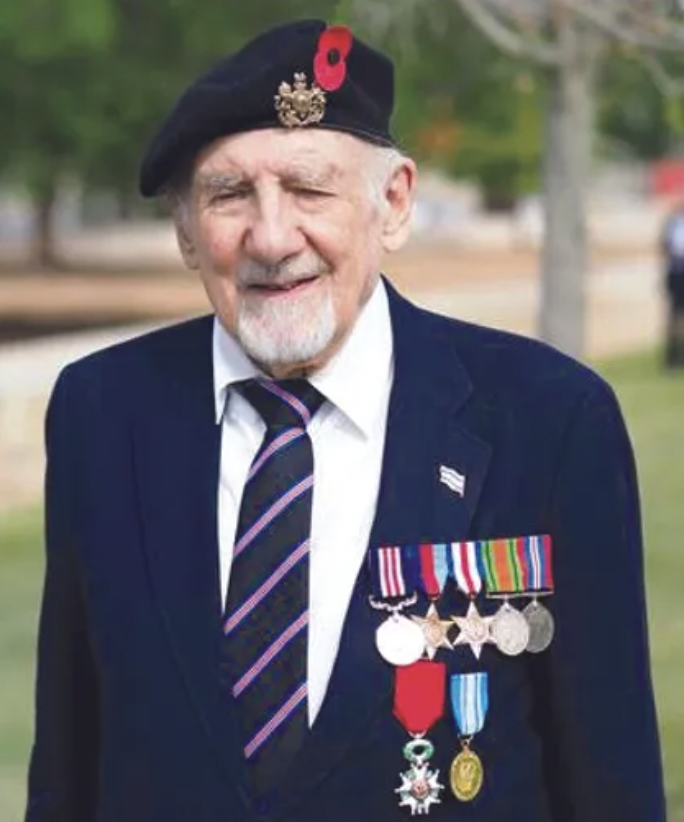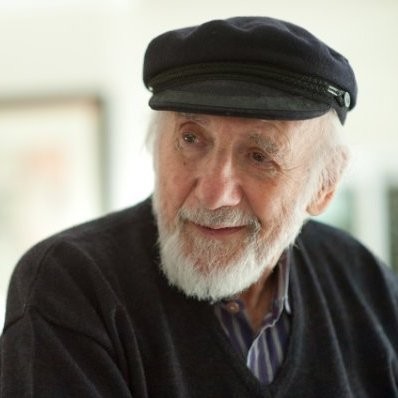A glimpse into 100 years of my multifaceted life
World’s oldest journalist celebrates centenary

An inspiration to us all, Jerusalemite Walter Bingham turned 100 years old on January 5. A Holocaust survivor who was rescued to Britain on the Kindertransport, Bingham went on to become a war hero (gaining both the British Military Medal and the French Legion D’Honneur) and an esteemed journalist. He holds the Guinness World Records title for both the oldest journalist and oldest active radio show host. Defying even further odds, the indefatigable adopted Brit made the ‘big move’ alone, as a widower. Yes, at the grand age of 80, Walter became a proud Israeli and a further blessing to many. His daughter also lives in Jerusalem. With thanks to The Jerusalem Report, here are some excerpts from Walter’s own article, written to mark his centenary.
Who would have thought that following the defeat of Nazi Germany in World War II, and the almost unanimous international condemnation of antisemitism, the slogan ‘Never again’ would today sound hollow? For reasons we cannot fathom, once again, God allowed an enemy to rise up, trying to destroy the Jewish people. But like always in history, we shall see our persecutors destroyed.
My first three years at school before Hitler were uneventful, but after 1933, as a Jew, going to school became a harrowing experience. I had to endure taunts and physical attacks. Complaints did not bring a reaction from the teachers. The Aryan boy who sat next to me copied my work and received good marks, while my work was marked down. Eventually, I had to sit at the back of the classroom. Soon, all Jewish students, as well as educators throughout Germany, were expelled. A temporary Jewish school was established in my city, and during that time, my marks rose considerably!
It was 1938 when my parents saw an opportunity for a year of further Jewish education and sent me to the city of Mannheim, where I was accommodated in the kosher orphanage. Every day, I walked to the schoolroom in the synagogue building. The school year began after Passover, and I enjoyed the experience, which only lasted seven months. During my stay there on October 28, I learned that Polish Jews had been arrested. As my family was part of that community, I was afraid and wanted to return home. “Stay where you are,” said my mother on the telephone; “they have just taken your father away.” I never saw him again.
Writing about Kristallnacht, the night Walter says that the Holocaust began, he recalls the following:
As usual, on that morning I walked to school. Even on the way I felt the strange atmosphere; there were many more people in the streets, and as I approached the synagogue I realized why… Masses of people were staring at the building that was still smoldering. The fire service stood idly by in order to protect the neighboring properties from being damaged! It then became clear to me what was happening. Having gathered my thoughts, I returned to my accommodation, telephoned my mother and said, “I am coming home.” I remember clearly that I took the 3:22 Diesel train and, on arrival, found that in Karlsruhe as well the story was the same.

In order to earn some money, I used my skills to repair electrical appliances by adapting irons and other items from 220 to 110 volts for immigrants to the US. I also helped to clean up damage in the Jewish hotel.
Having lost their businesses or after having been dismissed from their employment, many Jewish families were trying to immigrate to the
US or the UK; however, they required sponsorship or proof of financial independence, making it almost impossible, and this applied to my own family.
The Jewish establishments in those countries did not pressure their governments sufficiently to accept Jewish refugees because they feared that “too many Jews cause antisemitism.” So my mother and I had no opportunity to leave Germany. It’s interesting how times and attitudes in Europe have changed, so that even illegal immigrants are being welcomed and cared for.
About the Kindertransport initiative of the British Government, he writes:
Following Kristallnacht, there was an appeal by European Jewish communities to British Jewish philanthropic organizations to save Jewish children from Nazi Europe. It bore fruit when they succeeded after pressure on the government to act. It was miraculously approved very quickly, and visas for 10,000 children were issued.
Throughout Germany and Nazi-occupied areas, children – some as young as 18 months, up to the age of 17 – were selected by some obscure quota system. In Karlsruhe, my name was on the list. On July 25, 1939, at age 15 and a half, I left the city of my birth. It was a traumatic experience when my mother took me to the railway station, not knowing when we would meet again because everyone knew that war was imminent. However, one dark cloud hangs over this humanitarian enterprise: It was an insensitive stipulation that children be sent unaccompanied, without their parents. That’s why my mother had to remain behind.

Since I was older, I was able to find a place by the window in order to wave goodbye as the train pulled out, taking me to safety. I often think of the parents’ emotions when they returned to their homes. They had sent their children into the unknown; remembering the faces of their small toddlers as they cuddled their doll or teddy bear, crying and thinking that they were being abandoned by their parents when they placed them into the arms of strangers and left the train. For the little ones, the trauma could only be compared with being abducted.
While heavily affected by this traumatic event, for me the trauma was initially mixed with some sense of adventure of going on a journey on an international train through foreign countries. But the reality quickly sank in as the train pulled out and I, too, felt alone.
As the ferry left the port at Hoek van Holland for the six-hour journey to England, in what was freedom.... as I stood as a youth at the rails of the open deck, the vivid memories from home flooded in. I remembered thinking, “Where are they taking me to? When will I see my Mama and Papa again? After all, I don’t know anybody and cannot really speak English. What will become of me?”
Walter describes being taken, as part of a group of kinder, to a beautiful but dilapidated castle in Abergele, North Wales, where he and other teenagers were given all manner of chores. He continues:
At some point toward the end of 1942, I was confident enough to leave for London in search of a new life. That came in an unexpected form when I was called up to join the Polish army in exile, which was stationed in the UK. Not knowing the language and having no real connection to that antisemitic country, I refused. However, the idea of fighting the Nazis appealed to me. After the Royal Air Force turned me down for a pilot’s course (even then, my eyesight was not 20/20), I joined the British Army instead. In wartime, many airmen die young; as I lived to be reunited with my mother after the war, I believe that divine providence played its part.
Going against the flow, Walter said he ‘ignored’ an unspoken rule in the army, never to volunteer, and became an ambulance driver:
For almost a year, I evacuated the wounded during heavy fighting through France, Belgium, and Holland. My application to be transferred to a job where my language knowledge of German would be useful was long delayed; but it was finally approved, just before the horrendous battle for the Rhine Bridge at Arnhem in September 1944, known as “A bridge too far.”
Once again God spared my life. That ended the first and most dangerous phase of my military service, which had an indelible effect on my life and maturity.
THE CONTRAST, Walter writes, from the battlefield to counter-intelligence training at a secret office at London’s Oxford Circus was stark but welcome. Imagine the feeling of soaking in a bathtub after much of the year in a dugout. It was heaven!
It was May 8, 1945: Victory in Europe Day when, after having spent time at HQ Intelligence Corps Brussels, I left for Hamburg to begin the work for which I had been trained – to evaluate Nazi documents and correspondence and to ascertain who among the suspects we interrogated fell into the arrest categories of the various Nazi organizations.
I had not long settled in when, in mid-June, I was asked to speak with a high-profile prisoner captured in the city. He turned out to be Joachim von Ribbentrop, the Nazi foreign minister. We sat about one meter apart in my office, just he and I. This ardent Nazi, who was in overall charge of everything that had happened in Nazi-occupied Europe, looked me in the eye and denied every knowledge of the Holocaust. When challenged, he claimed to have read about it in the newspaper. His arrogance and delusions of grandeur had no bounds. Faced with my camera, and imagining that it was for publicity, he rose and requested to have a shave first. That’s when I raised my voice and told him to sit down. Some more questioning followed before I had him removed.
At the Nuremberg war crimes trial, Ribbentrop was found guilty of conspiracy, crimes against peace, war crimes, and crimes against humanity and was sentenced to death. He was the first to be hanged at 01:30 a.m. on October 16, 1946.
On his discharge from the army, on 31 December 1947, Walter was again totally alone…
Watch this blog to read the second part of his incredible story by The Jerusalem Report.

Speaking on the eve of his birthday to Revital Yakin Krakovsky, Deputy CEO of the International March of the Living, Walter said:
I've always felt a deep connection to the Jewish people and our homeland. I value the moments I've spent fighting against tyranny and promoting the truth through journalism. I could never have imagined that at the age of 100, I would be a witness to the horrific pogrom against Jews that took place on October 7 and the terrifying resurgence of antisemitism since [also covered by an interview with Walter in the Daily Telegraph]. As I celebrate today, I also pray for the future of the State of Israel and the Jewish people.
Revital Yakin Krakovsky, Deputy CEO of the International March of the Living, contributed to this report.
Happy Birthday, Walter! Mazal Tov!
This article originally appeared in The Jerusalem Report and is reposted with permission.

Walter Bingham British-Israeli journalist, actor and businessman, as well as a Holocaust survivor and decorated World War II veteran.













